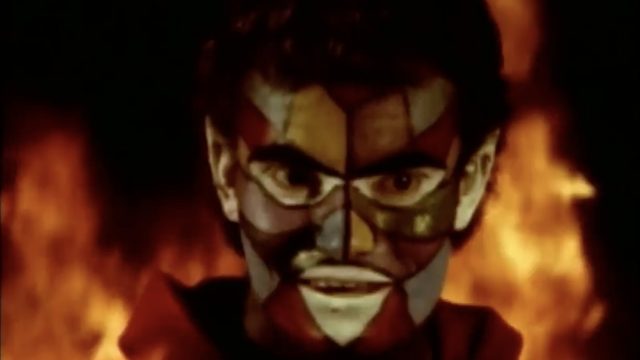This Week the Devil is in the Details of:
- drive-in salvation
- festival coverage
- a flamboyant wrestler
- reply-all!
I’ll be damned, we got contributions from scb0212, Drunk Napoleon and Miller this week! Send articles throughout the next week to ploughmanplods [at] gmail, post articles from the past week below for discussion, and Have a Happy Friday!
Chris Campion writes in The Guardian about the Ormonds, a family of schlock drive-in artists who practiced their trade for God:
The three films they made follow a simple formula. Pirkle delivers a fire and brimstone sermon straight to camera as disturbing images play out in the mind of a wavering parishioner, leading to a “come to Jesus” moment. The poster for the first co-production, 1971’s If Footmen Tire You, What Will Horses Do?, promised “A Frightening Prophecy of a Doomed America”. The movie, a masterpiece of John Birch Society-style paranoia about a communist takeover of America, more than delivers. A boy is decapitated by a uniformed commissar for refusing to stomp on a picture of Christ, another has a skewer put through his ears. There is no end to the depravity Pirkle imagines and Ron Ormond realises on screen.
Festival coverage! Mark Asch savages Taika Waititi’s latest for Little White Lies…
It’s just impossible to trust someone this ingratiating — I detect in Waititi a contempt for anyone simple enough to buy what he’s selling, which is implicit in the lazy plotting; in the embrace of the hoary sports-movie cliché of the unpolished star discovered when he happens to kick something in anger with a foot like a traction engine; in the barely-disguised meanness with which he builds up soppy moments and then winkingly undercuts them; and the knowing, out-of-character winks to the audience about “white saviours,” as if assuring us that the guy behind the camera is hip despite all his pandering with antic slapstick and dopey one-liners.
…and for Sight and Sound, Adam Nayman elaborates on the darkness at the heart of Richard Linklater’s new movie:
The reason that [lead character] Gary’s marks can’t see through the subterfuge is that they’re mesmerised by their own murderous motivations. The procession of small-town folks contemplating paid assassination as a solution to their problems somehow simultaneously evokes Jean Renoir’s Rules of the Game (1939) — everyone has his, or her reasons — and Kurosawa Kiyoshi’s Cure (1997), with its intimations of everyday bloodlust unleashed and absolved via a little bit of positive reinforcement. During a courtroom montage, Gary is referred to by defense lawyers as a predator and an opportunist, and Linklater, who may be more interested in thought experiments than any other working filmmaker, invites us to ponder the accuracy of those accusations.
For The Hollywood Reporter, Rebecca Keegan talks to filmmaker Roger Ross Williams about his first scripted movie, the true story of gay luchador Cassandro:
When I was making the documentary on Cassandro, I went to this wrestling match with the real Cassandro in Juarez, Mexico, which at the time was, maybe still is, one of the most dangerous cities in the world because of the cartels. I walked into this wrestling arena, thousands of people. The match starts. I’m standing backstage, and they start to play his theme song, “I Will Survive.” And the whole audience is singing. Thousands of people. As he’s walking out, they’re handing their babies to him to kiss. Children are hugging him. I just burst into tears. I was weeping. I was like, what is going on here? I just couldn’t process it in my mind. He took the stage in his full gown and spins around and rips his train off and throws it to the audience. And I was like, fuck. This is my first scripted film.
At Bright Wall/Dark Room, Emma Ward looks at Petite Maman‘s use of time and twins:
As a child, I liked to think about time passing not in a line but in layers. The way I saw it, our experience of the present moment was both subjective and constant; for any person, at any time throughout history, “right now” is a perpetually occurring thing; in any given location, there are a million different “right nows” that have been and are being experienced. […] Céline Sciamma’s 2021 film Petite Maman manages to recognize the rich and complex interiority of children—a rarity in art, especially art made by and for adults. Its pair of eight-year-old protagonists are wise and curious, somber and playful. In one scene, they’ll offer a poignant word on loneliness or grief, while in the next, they smear crêpe batter on each other’s faces. The juxtaposition of these two moods never feels contrived, never seems designed to say something; it simply depicts children as children know themselves to be. It makes sense then that it would be in this film, and not anywhere else, that I would find my childhood notion of layered time understood and made visible.
And finally, as a new Scot Pilgrim animated series looms, creator Bryan Lee O’Malley recounts how Michael Cera revived a decade-old email thread before the project came together:
“The cast have spoken about this email chain a lot but there’s one detail that I don’t think anyone has mentioned,” O’Malley said. “We were exchanging emails when the movie was coming out and then this thread went dormant for about nine years. Then, before this anime was even on the docket, Michael Cera responded to a meme someone had sent as if no time had passed. He just said, ‘Oh, that’s funny.’ Chris Evans responded like, ‘Michael, what the fuck are you doing responding to this email from nine years ago?’ And then we all started chatting again.”


